“Help, I hate pictures of me!” I hear it all the time. I’ve felt it too.
Every photo presents a new opportunity to critique, scrutinize, and tear ourselves apart. It was bad enough when we had printed photos to hold up and wrinkle our noses at. But, now we can see each of our photos in whatever size we choose on our screens. Can’t see it well enough? No worries. Just spread your fingers apart to enlarge that image and get a better view of how the flesh bulges under your arm pit, or how your thighs touch from top to bottom.
Ugh. Friend, I get it. Pictures can be rough.
They can serve as unpalatable evidence of the gap between what we actually look like and what we want to look like. And, they can cause our body image issues to flare in a way that even mirrors or the scale can’t match.
If you hate the way you look in pictures, then I have some advice that I hope you’ll find helpful.
The Solution is Not in a Diet or Surgery to Get the “Perfect Selfie”
Since the advent of selfies, plastic surgery rates have skyrocketed as women make “looking perfect” in photographs a life goal. Friend, not liking how you look in pictures isn’t a body problem, it’s a body image problem. Your body image is how you feel about the way you look. Models still struggle with how they look in pictures. The odds are high that nothing you can do to “fix” your “selfie” will make you satisfied with how you look in photos.
The Solution is Not to Avoid Pictures
I repeat: The solution is not to avoid pictures. Please don’t do that. Numerous blog posts have been written on the topic, but by staying out of the picture I wonder what you’re actually communicating to those around you. Only the “perfect” should be photographed? Only the “good-looking” are valuable enough to be in pictures? Intellectually, we know that’s not true–but I wonder what we communicate when we say “Oh, no, please! I don’t want my picture taken!”
Let’s say you’re at a party with friends and not feeling great about your outfit or body. Someone pulls out their phone to take a group photo for Facebook and you suddenly have to go to the bathroom. Or, maybe your on vacation with the family and a kind passer-by notices you taking the photo of the rest of the family and says, “Why don’t you jump in the picture too?” You wave him off. It’s okay. You’d rather not be in the photo.
But, here’s the strange thing. In most cases, we still enjoyed being there. We had fun spending time with our friends or making memories with our families. We’re glad we were in those moments. So, why do we hate having those moments marked with a picture? Where’s the disconnect?
Ready for this? It’s objectification.
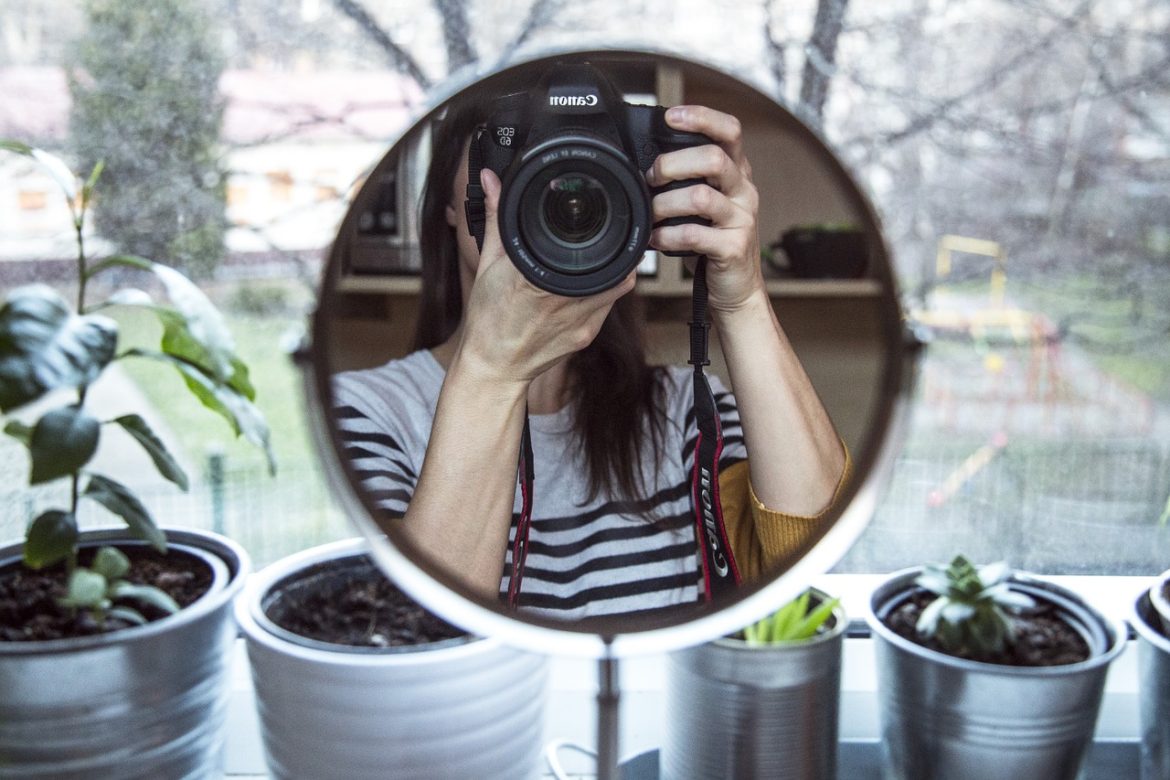
Objectification?
The clinical answer as to why looking at pictures hurt is objectification. When we see a picture of ourselves — and are in a struggle with body image — we only see ourselves in one dimension, physically. We mentally block out the people smiling around (or at) us. We forget how the photo symbolizes the fun we had. In fact, we don’t even notice the magnificence of the location. Instead, we zoom the lens of our own eyes onto our bodies. Soon, nothing else matters.
A body is all we see–a flat, one-dimensional object we can choose to critique like a teacher looking for wrong answers on a test. Circle those flabby arms with red ink! Oh, add those bags under my eyes, more points deducted for imperfection! We dehumanize ourselves. Truth is, we scold ourselves for not looking less human.
Now, why do we do this?
It’s not entirely our fault. We’ve been trained since childhood to look at pictures as aspirational symbols of perfection. Marketers have conditioned us to see in pictures all that we “could” or “should” be so that we’ll buy their products. You want flawless skin? Look at this model’s perfect, air-brushed skin. You should buy this cream. Then you will look like the model.
So, we buy the cream. We see a photo of ourselves. We don’t look like the air brushed model.
A weird sense of shame floods us. It’s like maybe something is wrong with us because it didn’t work. We don’t default to “we were lied to” or “it’s okay that it doesn’t work that way.” Instead, we determine there’s something wrong with me because I’m (still) not perfect.
Digging into Shame
Let’s go deeper with that. Why do we have guilt and shame over our imperfections? We can take pause and thank Adam and Eve for that one. Shame didn’t exist before the garden, remember? Adam and Eve bought that tricky marketer Satan’s lie. They already had it good. Somehow, he convinced them they could have it better. They bought the lie and changed the trajectory of mankind. Then they knew their imperfections. Shame forced them into hiding because of their flaws.
But, the good news is, that’s the exact shame that Jesus came to free us from. He says that his sacrifice, his blood, covers all of our guilt and shame and makes us “flawless” in his eyes.
Now, it’s that last part that’s important. In HIS eyes. We may never be able to see ourselves as lovely as God does. And, that’s okay.
What if You Never See Yourself as Flawless?
It’s true: Chances are high that we’ll never look at a photo of ourselves and determine we’re flawless in the way that matters in this life. For those of us who struggle with body image, we may never even see photos of ourselves as beautiful or “worthy” either. It’s a battle. A constant battle. When we’re trapped in defining terms like “beauty” by the definitions our culture feeds us, we stay frustrated. One year we’re “in style” with our straight hair, the next year we’re “out of style” when everyone’s gone curly. In the 1940s women tried to put on weight to be more attractive. Now, as you well know, the pendulum has swung the other way.
But the older I get, the more I’ve noticed a strange phenomena. I’m not as hard on myself in older pictures as I am in more recent ones. Those photos from 5-10 years ago–the ones I would have told you “please don’t put that on Facebook!”–I honestly don’t mind them now. I look at them and think, “Wow, I wish I still looked that young!” Or, worse . . .”If only I were as thin as that now–How did I ever think I was too big then?”
Why can we palate them now? Because we don’t segment that person as just a body. We see that person as who we used to be. When we reflect back on who we were back then, we’re thinking about how we felt then, what we experienced then, who we were then. Chances are high you don’t objectify who you were a decade ago. Our memories don’t really let us do that.
Do Unto Others…
Think about what happens when you see pictures of other people. Sure, sometimes you may objectify the person in the photo. Maybe you blow up the screen to get better look at the thighs of the woman you compare yourself too… or maybe you zoom in on the abs of that fitness trainer on Instagram… But, when it comes to people you know and love -most of the time you’ll notice their smiles or the light in their eyes.
When you see photos of your children, do you mentally tear them apart? Do you feel frustrated that your son’s eyebrows are wild or that your daughter isn’t standing in a position that makes her arms look skinniest? Chances are, no. You love them. You see the photographs as a representation of them. You look at those pictures with love. I bet that’s how God sees our pictures too.
So back to the dilemma, what if we never see ourselves as we want to see ourselves in photos? What if we’re NEVER happy with the way we look in pictures? There’s only one thing to do if you’re a follower of Jesus. Ready for this?
Remember Whose Opinion is Most Important
Some of you are tempted to stop reading now. You’re not buying it. But follow me here, friend. You may never be flawless in your own eyes. But this is where GOOD theology becomes important. Because if you believe that your opinion of yourself matters more than God’s opinion of you, then you stay stuck. Paul in Corinthians says he “dares not judge himself” — only God can judge him. In other words – God’s opinion is the one that matters. His opinion of himself must bow to the opinion of God the father.
So, if you refuse to accept God’s opinion of you, then you’ve made your opinion of yourself an . . . yes, we’re right back to that famous word I use a lot…an idol.
An idol is anything that you look to, other than Jesus, to save you. Not that you believe looking “hot” in a photo is going to get you to heaven. Rather, you believe that if you could just get that perfect selfie (It’s a thing- people are getting plastic surgery to get it done) – then you’d find the peace, love, joy and rest you desire.
But, those things don’t come with the perfect profile picture or a whole album of perfect vacation shots. They only come with taking your eyes off you photos and putting them on Jesus. That’s where the freedom is found. God’s view of those photos of you, his opinion of them, is actually more important than your opinion of them. To obsess over them is truly a waste of energy.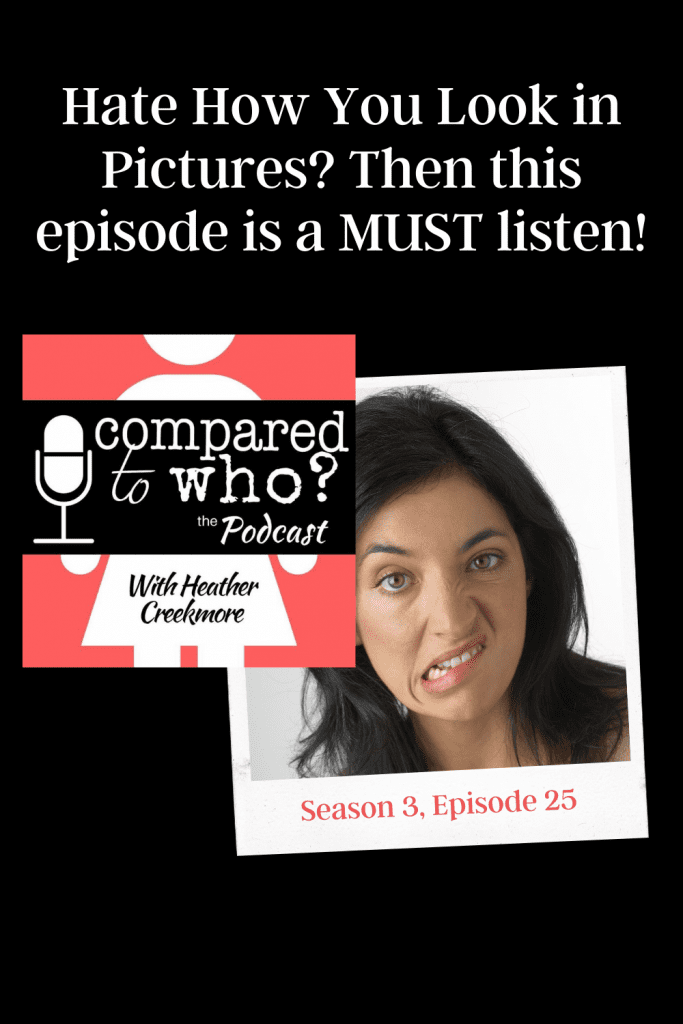
So, practically, what do I do to make peace with pictures?
It takes practice and encouragement to not live in the land of “I hate pictures of me.” I’ve been there. It can still be a struggle I have to talk myself through. But, you can make peace with your image in a photo the same way you make peace with your image in a mirror. Here’s what I’d recommend.
First: When you look at a picture do not stare at yourself.
Do not allow yourself to mentally “mark up” your body like a graphic designer sending the picture to the air brusher. You are a real woman. You are not a 20 year old model. (Okay, or if you are 20 year old model–the rest of this still applies!) You are not modeling clothing or skin cream. You’re modeling Jesus Christ. Is there light shining through your eyes? Are you smiling? Then it’s a good photo. Remember your job on earth is to REFLECT him, not win the “who looks hottest” contest of worldly beauty.
Second: But, You Don’t Have to Love All Pictures of Yourself.
Okay, yes, there are weird angles that we get caught in, etc… You don’t have to LIKE or LOVE all pictures. That’d be ridiculous. But, my encouragement is to stop being so hard on yourself and remind yourself that you’re being harder on you than God is. And, his opinion is the one that matters most. A bad photograph does not define your worth or value. A weird angle on your chin(s) or legs may not be flattering, accept the reality that no one looks model-good when bad angles or lighting are involved.
Third: Refuse to objectify OTHER women in photos.
We start this mental photo bank of what “women should look like in photos” — Try not to add to it. When you see another woman in a picture, do everything you can to not mentally objectify her. Look at her eyes – does she look truly happy or is their pain there? Look at her surroundings? Look at her family. Don’t blow up the image to see if her arms are flabbier than yours (okay, we’ve all done it) or if her legs really don’t touch in the middle. She’s a person. Treat her photograph as you’d treat her, with dignity and respect. And, then, treat your OWN photograph in the same way.
I’ll leave you with this truth, offered by a friend of mine with whom I had an extensive email conversation on this very topic. Her words read like this, “No mantra of saying “I am beautiful “ every day will compare with knowing truly how we are loved.” I couldn’t have said it better myself.
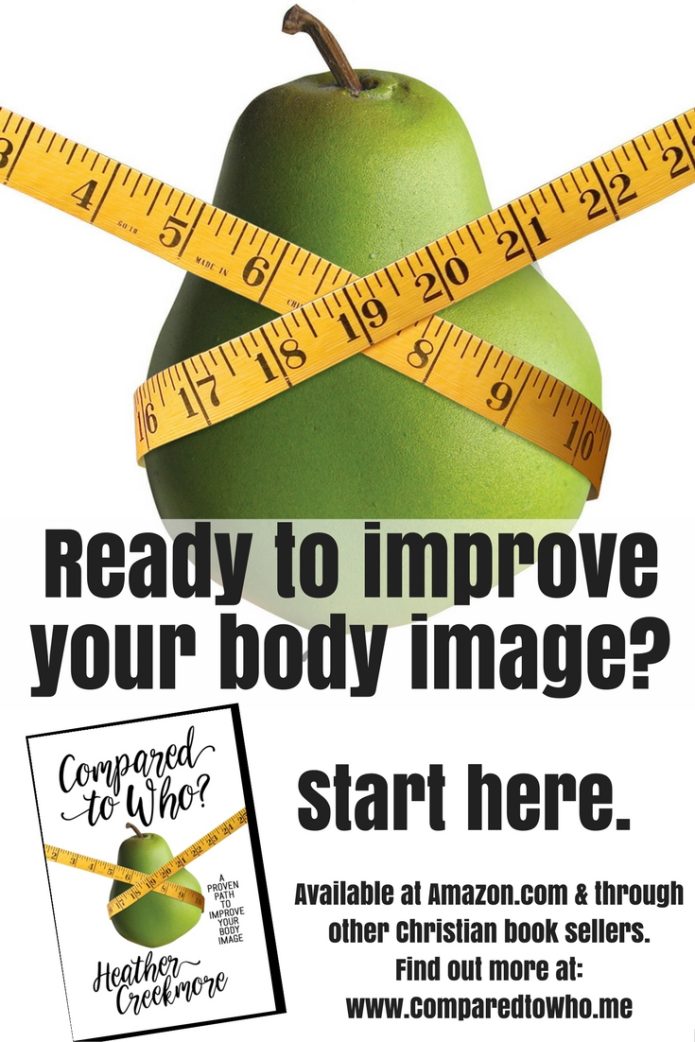
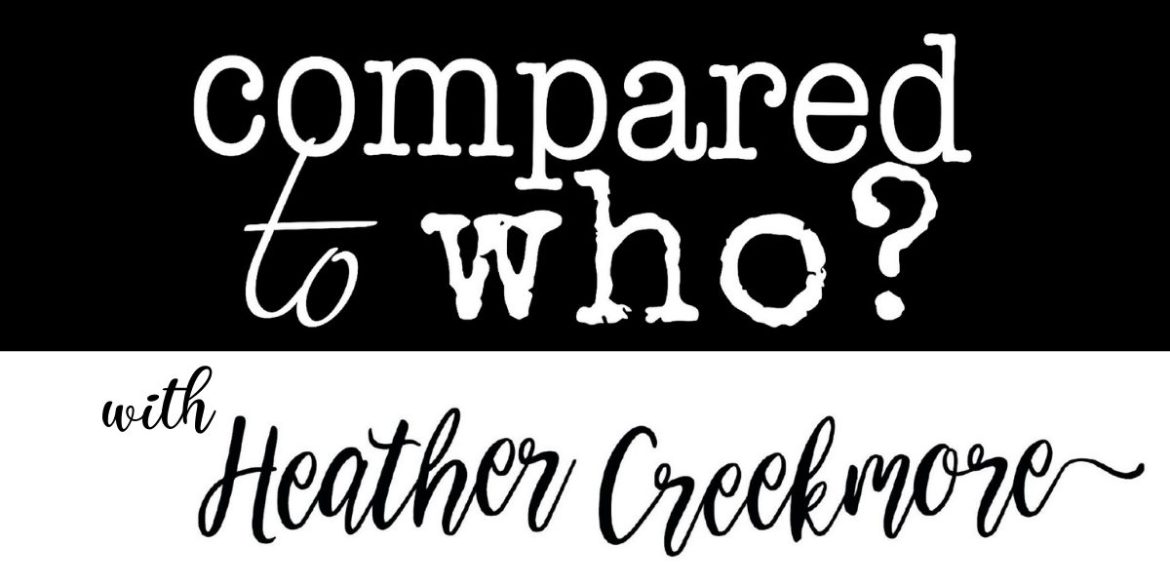

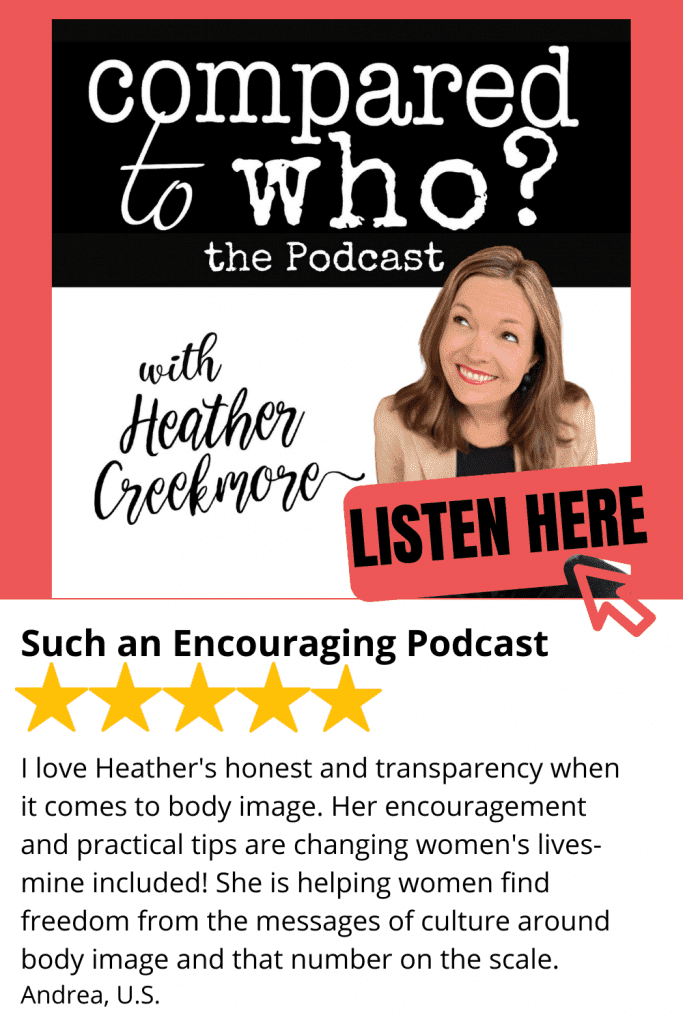

Thanks so much, I really resonated with the 3 steps to make peace with pictures. I so appreciate all that you do. Keep sharing how God loves us and focus on him, not what the world says we should look like.
I think the reason why I am so critical of the few pictures I am in is because I feel that if I don’t approve neither will my husband. I was married for 23 years to a wonderful man. He passed away from a brain aneurysm when he was 45. I since remarried. My husband today had a porn issue and Still has a lust issue that I learned about once we were married. There was no where we could go that I felt secure. He noticed women everywhere we went. I was insecure within myself before I met him but never felt like it was a problem with my prior husband. I knew he accepted and loved me the way I was. Today not the case. I don’t feel my husband is attracted to me and I spend all of my time trying to buy the perfect clothes and I have had numerous surgeries trying to get his attention. Nothing has worked. Our marriage is jeopardized by all of this. I have not been spending as much time with God as I need to because of this. His problems and my problems are not a good fit! So I’ve decided to work on myself. I searched the internet looking for ways to cope with my body image and insecurities. I found your site. I have ordered your book and can’t wait to dive in. I am so grateful that God puts things in front of you as he has with your website. Thank you for what you do for women struggling like me.
Kathy
Kathy – First of all, I’m so sorry to hear of your struggle. I do understand, completely. I’ve written a couple pieces on this His Lust Problem Is Not About You and Three Ways to Deal if Your Man’s Past Affects Your Body Image and a podcast What to Do if He Battles Lust: Help! My Christian Husband Looks at Porn. — So anything most of what I would say in comments I’ve said here. It’s so hard. I do think you are on the right path though. You can get to a point where it’s only God’s opinion of you that matters. That doesn’t mean it won’t still hurt sometimes, but Jesus will be faithful to be with you and remind you of how loved and accepted you are during those times. I am reminded of something from scripture -that may be helpful here – the Bible tells us that women will win over their husbands who don’t obey the word through godly lives (conduct or behavior) in some translations – 1 Peter 3:1. I also know other scripture talks about a gentle and quiet spirit. When I was in the heart of my struggle after marriage – I don’t think I was gentle and quiet – I was insecure and loud/frustrated because I wanted my husband to make it better. That doesn’t mean it was wrong to talk to him about it, etc… but, I was telling him with the hopes that he would fix it. And, he just couldn’t (Oh I think I also wrote a piece called body image in marriage… Body Image Issues in Marriage: Why No Mere Man Can Help Anyway, God can do more to transform our hearts and our husband’s hearts than we can through our words. So, I pray that for you and for your marriage. That God would soften your husband’s heart so that he can see how this hurts you. And, meanwhile, that God will draw you close to him and show you a path to freedom. I do work with women one on one or in small groups, so if you read the book and would like to work together, please reach out. Hugs, grace, and prayers!
Yay! Danielle! So, delighted to read this! Praying we can all keep our focus on him… even when we’re not loving photos!